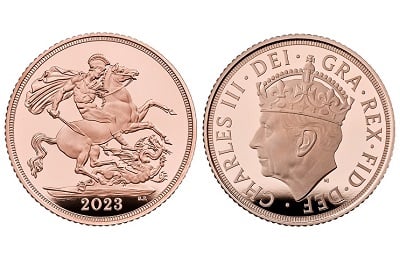Dei Gratia
Dei Gratia is Latin for 'By the Grace of God', and can be found on many coins around the world, and on UK coins in particular.
Dei Gratia Regina – often abbreviated to 'D. G. Regina' – translates from Latin to 'By the grace of God, Queen'. The Regina variation of Dei Gratia is well known today following the long reign of Queen Elizabeth II, but for many years 'Dei Gratia Rex' was used for the Kings of England. Dei Gratia Rex translates to, 'By the Grace of God, King'. The phrase Dei Gratia be found found on the obverse of many UK coins, in various forms.
Dei Gratia meaning
'By the grace of God' – in Latin 'Dei Gratia' – is an ecclesiastical motto which refers to the historic concept of a monarch's divine right to rule. According to this belief, a monarch is chosen by God to rule over a country. This means the monarch then is answerable only to God; he or she is not subject to the wishes of the people, aristocrats, or government.
Dei Graita has been used on coins for centuries; the Roman and Byzantine Empire both stamped the phrase on their coins as a sign of the ruler’s divine right to rule. Today, the phrase Dei Gratia is taken less literally, and generally means that the monarch has been chosen by God, and reflects the Queen’s role as head of the Church of England.
Dei Gratia coins
Various nations, with a monarch as head of state, have used this Latin phrase on their currency. This includes the United Kingdom, and many Commonwealth nations, plus Spain and Sweden.
Spanish coins with Dei Gratia include, Carolus (Charles) III and IV, Colonial 1/2, 1, 2, 4, and 8 Reales from 1772 to 1808 (as seen above on the left). Swedish coins during the reigns of Queen Christina and Karl XI also carry the inscription. Current Swedish coins, however, do not.
In 1849, the
Florin
was introduced as a tenth of a pound, or two shillings. It was an early attempt at decimalisation. This first Florin did not carry the usual phrase of Dei Gratia, and this caused a furore; earning it the nickname of the 'godless' Florin.
The first, 1849, Florin omitted the ‘Dei Gratia’ inscription. This earned it the nickname of the ‘Godless’ Florin.
In the UK, since 2015, the phrase has been extended to 'Elizabeth II Dei Gratia Regina Fidei Defensatrix'. This is abbreviated to 'Elizabeth II·Dei·Gra·Reg·Fid·Def'. It translates as 'Reigning by the Grace of God, Defender of the Faith.'
It appears on the obverse (heads) of various coins and is followed with the date. This includes current circulating currency coins; £2, £1, 50p, 20p, 10p, 5p, 2p and 1p.
Current £1 showing D·G·REG·F·D inscription: Dei Gratia Regina Fidei Defensatrix – ‘Reigning by the grace of God, Defender of the Faith.’
The inscription also appears on many bullion coins. These are legal tender coins, and continue the tradition of stamping Dei Gratia (or D·G) on the obverse.
Gold Britannias are the most popular one ounce gold coin for larger UK based private investors, as they are Capital Gains Tax Free. With a face value of £100.00, the current 24-carat, Britannia also carries the 'D·G·REG·F·D' inscription.
Gold Britannia, Sovereign and £5 coins, plus silver Britannia coins, are amongst just some of the current bullion coins that carry the legend 'Dei Gratia' to this day, continuing this long standing tradition.
- How To Buy Gold
- How to Buy?
- Payment Options
- Delivery Options
- Gold Storage
- Storage at Brink's
- Gold Investment Guide
- Why buy gold?
- Is gold a good investment?
- Why physical gold?
- Best time to buy gold?
- Gold bars vs coins?
- Gold vs Silver
- Gold - Silver Ratio explained
- VAT on bullion
- CGT on bullion
- Legal tender coins
- Top 5 Gold Investments
- Top 5 Silver Investments
- Gold vs ISAs
- Gold vs Buy-to-Let
- Gold vs FTSE 100
- Gold vs Bitcoin
- Where to buy gold?
- Why buy from us?
- Where to sell gold?
- Coin Shops
- Gold Price Forecasts
- Top 10 Gold Producers
- Top 10 Gold Reserves
- Gold Britannia vs Sovereign
- Britannia coin designs
- Sovereign coin designs
- Sovereign Mintages
- Sovereign mint marks
- British coin specs
- What is a proof coin?
- Royal Mint bullion
- The Queen's Beasts
- Royal Mint Lunar Coins
- Bullion Refiners
- British coin mints
- Krugerrands
- Gold Tola - India & Pakistan
- Bullion Index







